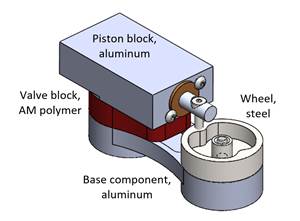Share




D.J. Amici Tool, Inc. is an eight-person shop in Algonquin, Illinois, a northwestern suburb of Chicago. Recently, the shop adopted a system of modular precision boring tools and has seen a significant improvement in productivity. For example, the shop had been using dedicated tooling to bore four holes 2 inches in diameter and 2 inches deep on one of the steel die sets Amici machines for its customers. This job had been taking more than four hours, according to Don J. Amici, the owner.
The shop had been running this job at a speed of 150 rpm and feed rate of 0.5 ipm. With the new tooling, it runs at 1,432 rpm and 5.72 ipm. Increased productivity is not the only benefit the shop is obtaining from the switch to precision boring tools. “We have seen a 120-percent improvement in quality,” says shop manager Fernando Collado. Before trying the new tooling, Amici craftsmen devoted hours to holding concentricity and achieving repeatability, Mr. Collado reports. Now, he says, they are getting used to first part precision and consistent repeatability.
The company prides itself on getting jobs done right and delivering them on time. Its return rate is close to zero, according to Mr. Collado, and its on-time rate is 99 percent. Customers include makers of electronic components, concrete forms, aluminum and vinyl home siding.
Amici Tool has doubled in size over the past two years. The company originally started in 1978 in the Chicago suburb of Bensenville. First came a move from a 2,500 square foot shop in nearby Crystal Lake to a 6,500 square foot facility in Algonquin. Then the company began a move from manual production to automated CNC equipment. Half the new shop’s manufacturing area is now devoted to automated production on three new wire EDMs (electrical discharge machines) and two CNC vertical machining centers.
Die sets that required a week to machine on the manual side are now completed in a day, according to Mr. Collado. Amici is running jobs at speeds and feeds that are much higher than its earlier capabilities. Mr. Amici says that its move to CNC equipment has enabled his shop to charge the customer less, build more business and produce a better profit as a result.
About 20 percent of the company’s machining is boring, a higher percentage than found in the average shop, Mr. Amici believes. He cites growth in its major markets with today’s strong economy as a contributor to his company’s growth, along with the company’s increases in productivity.
Acquiring the modular boring tool system, from KPT/Kaiser Precision Tooling, Inc. (Elk Grove Village, Illinois) is an example of how the shop is taking full advantage of its investment in CNC equipment. The shop is currently using the precision boring heads and indexable drills from this modular system. It plans to try the system’s spade drills. The system also includes twin cutter heads, single cutter finishing heads, balanceable and automatic balancing heads for high speed applications, tapping attachments, chamfering tools, modular toolholder components and a line of accessories.
Although Amici Tool has been growing, Mr. Amici intends to watch this growth carefully. “If you get too big, you lose control,” he explains. He says the industry has seen an increase in the number of smaller tool and die shops in recent years, in part because creating dies is custom work.
Related Content
Workholding Fixtures Save Over 4,500 Hours of Labor Annually
All World Machinery Supply designs each fixture to minimize the number of operations, resulting in reduced handling and idle spindle time.
Read MoreHow I Made It: Amy Skrzypczak, CNC Machinist, Westminster Tool
At just 28 years old, Amy Skrzypczak is already logging her ninth year as a CNC machinist. While during high school Skrzypczak may not have guessed that she’d soon be running an electrical discharge machining (EDM) department, after attending her local community college she found a home among the “misfits” at Westminster Tool. Today, she oversees the company’s wire EDM operations and feels grateful to have avoided more well-worn career paths.
Read MoreSolve Worker Shortages With ACE Workforce Development
The America’s Cutting Edge (ACE) program is addressing the current shortage in trained and available workers by offering no-cost online and in-person training opportunities in CNC machining and metrology.
Read MoreInside Machineosaurus: Unique Job Shop with Dinosaur-Named CNC Machines, Four-Day Workweek & High-Precision Machining
Take a tour of Machineosaurus, a Massachusetts machine shop where every CNC machine is named after a dinosaur!
Read MoreRead Next
5 Rules of Thumb for Buying CNC Machine Tools
Use these tips to carefully plan your machine tool purchases and to avoid regretting your decision later.
Read MoreRegistration Now Open for the Precision Machining Technology Show (PMTS) 2025
The precision machining industry’s premier event returns to Cleveland, OH, April 1-3.
Read MoreBuilding Out a Foundation for Student Machinists
Autodesk and Haas have teamed up to produce an introductory course for students that covers the basics of CAD, CAM and CNC while providing them with a portfolio part.
Read More



















.jpg;maxWidth=300;quality=90)











